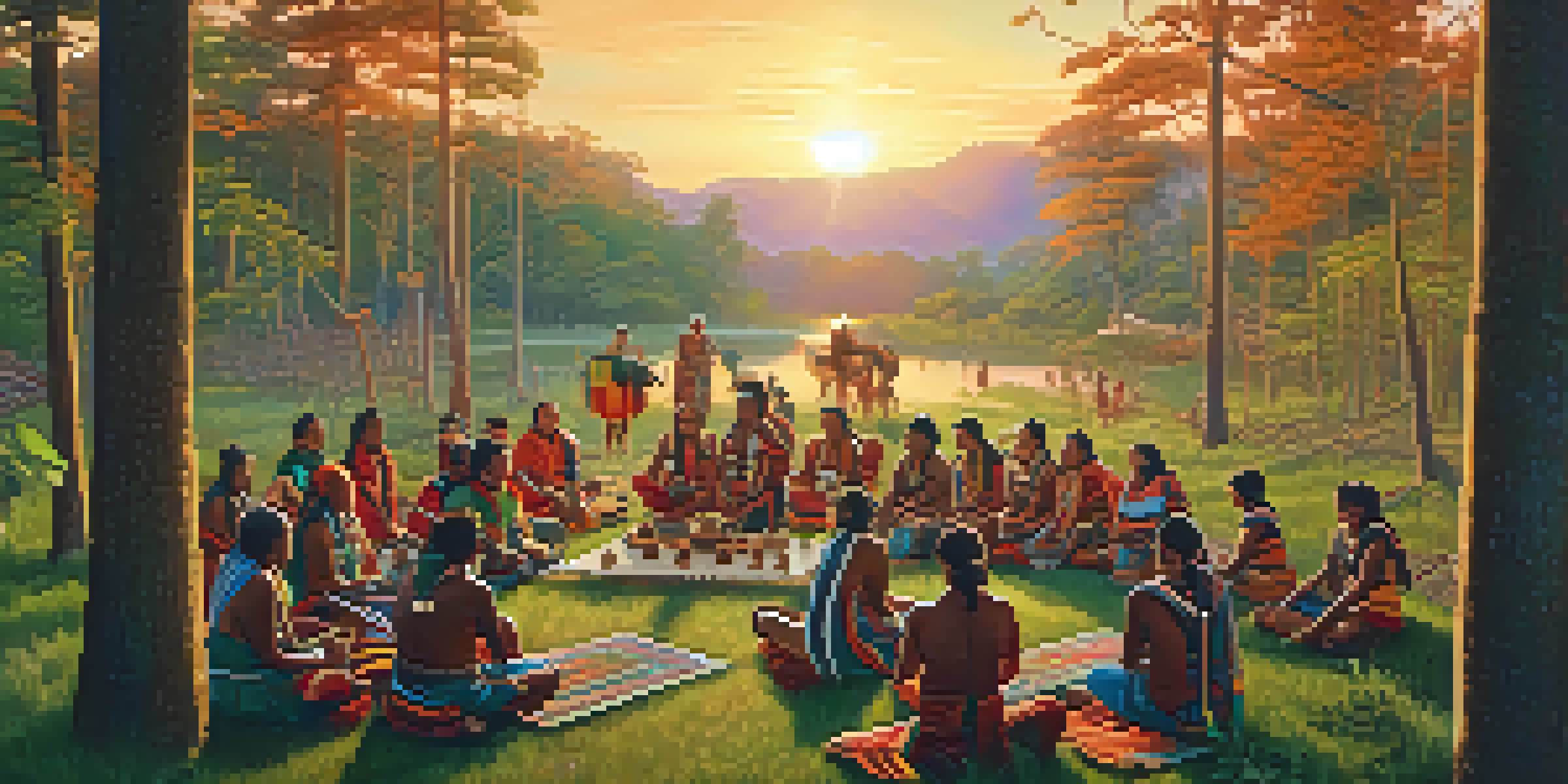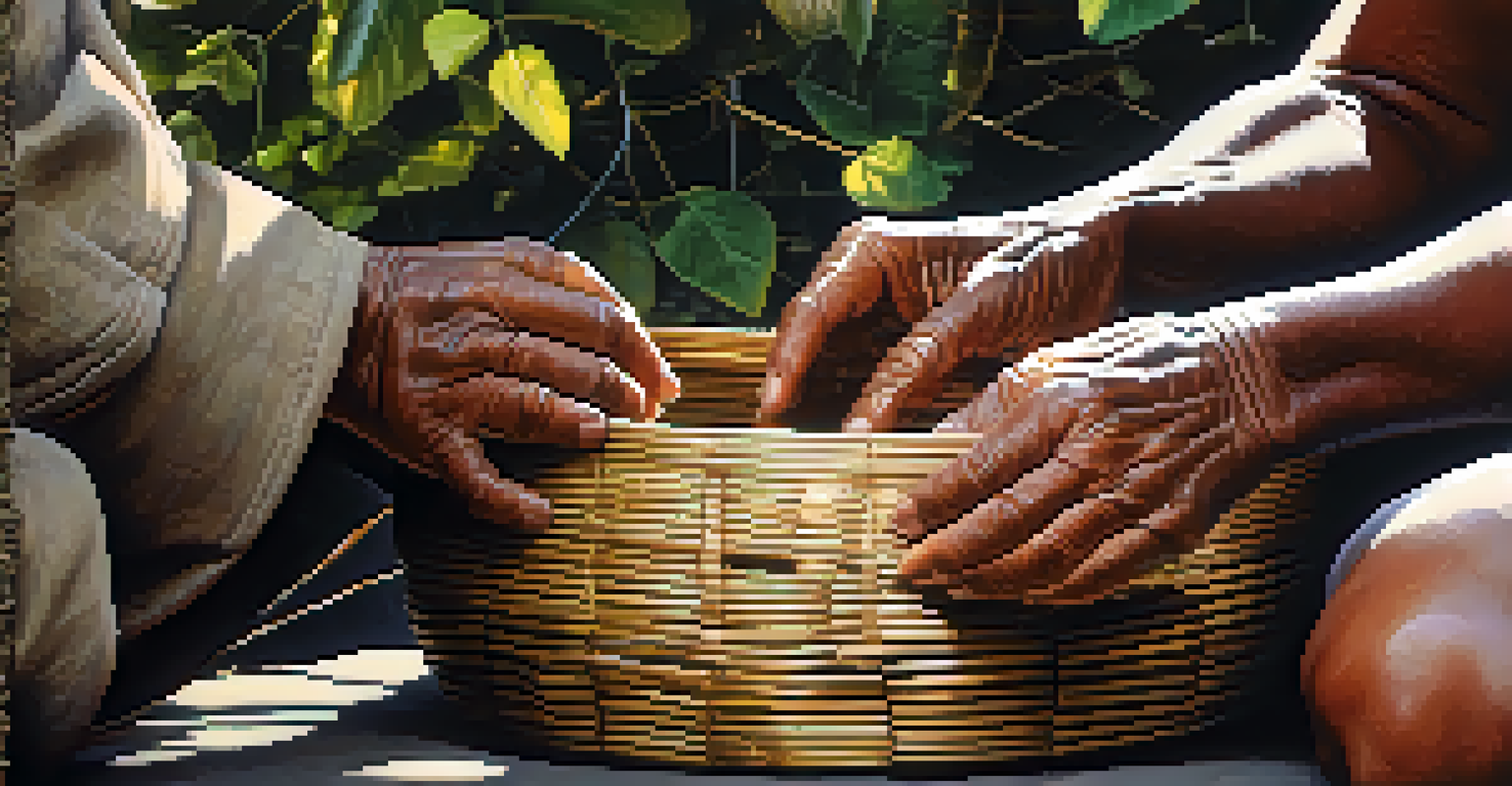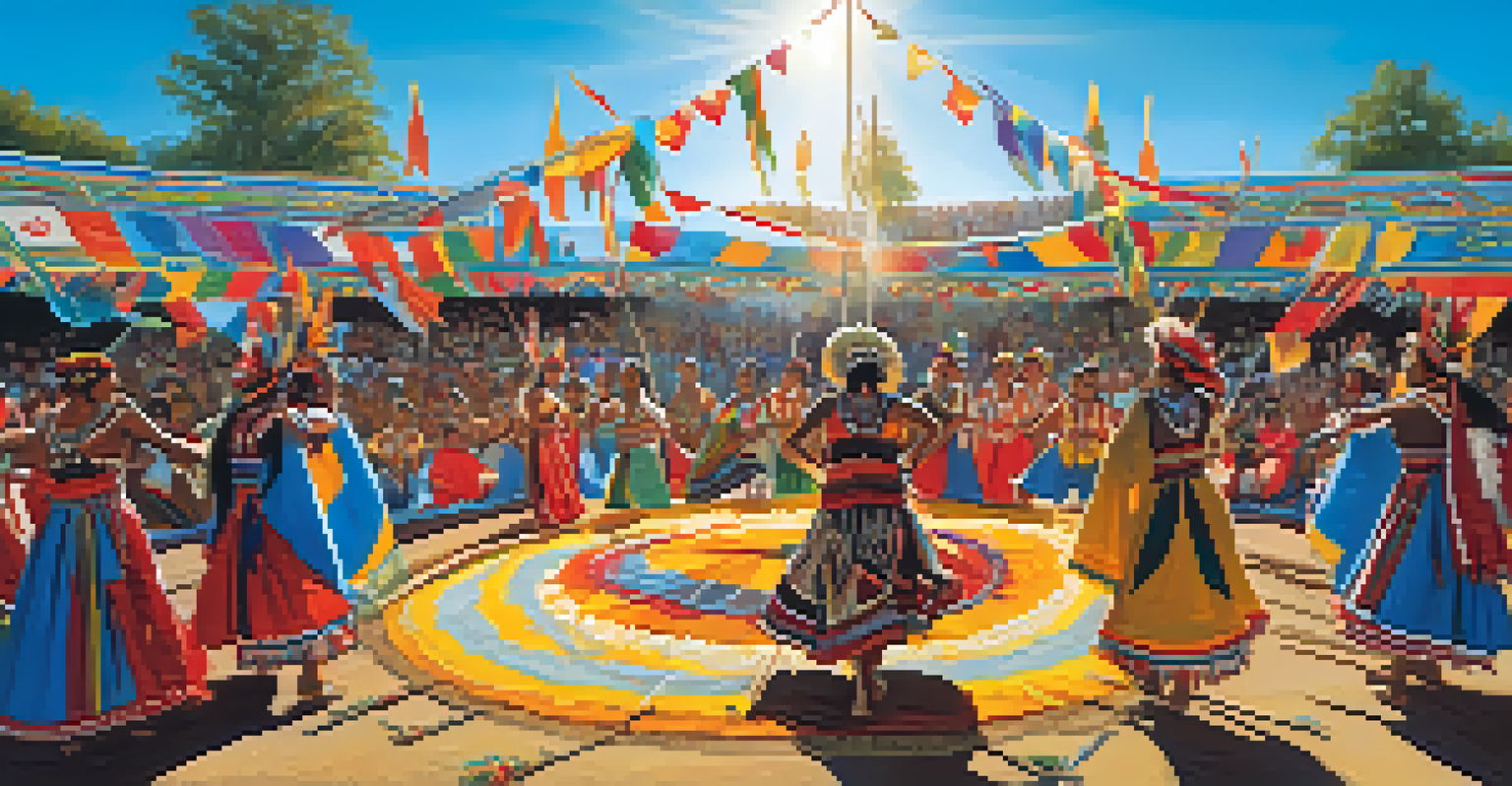The Impact of Colonialism on Indigenous Spirituality

Understanding Indigenous Spirituality Before Colonialism
Indigenous spirituality is deeply rooted in the connection to land, nature, and community. It encompasses a diverse range of beliefs, rituals, and practices that reflect the unique cultures of Indigenous peoples. For many, spirituality is not just a personal experience; it is a communal one, where traditions are passed down through generations, fostering a sense of belonging and identity.
We are all connected to the earth, to each other, and to our ancestors. Our spirituality is the breath of life that flows through us and ties us to the past, present, and future.
Before colonialism, Indigenous peoples practiced their spirituality freely, often intertwining it with their daily lives. Ceremonies, storytelling, and seasonal rituals not only honored their ancestors but also reinforced their relationship with the earth. This holistic worldview promoted harmony with nature and a profound respect for all living beings, which was central to their way of life.
However, this rich tapestry of spiritual practices faced significant disruptions with the advent of colonialism. The imposition of foreign beliefs and systems began to undermine Indigenous spirituality, leading to a loss of cultural identity that many communities are still recovering from today.
Colonial Strategies and Their Effects on Spiritual Practices
Colonial powers employed various strategies to control Indigenous populations, often targeting their spiritual practices. One common tactic was the introduction of missionary work, which sought to convert Indigenous peoples to Christianity. This not only aimed to replace Indigenous beliefs but also to erase the cultural narratives that defined their identities.

The establishment of residential schools further exemplified the detrimental impact of colonialism on spirituality. Indigenous children were forcibly removed from their families, stripped of their languages, and prohibited from practicing their spiritual traditions. This systematic oppression created a disconnect between the younger generations and their ancestral beliefs, leading to a generational gap in spiritual knowledge and practices.
Impact of Colonialism on Spirituality
Colonialism disrupted Indigenous spirituality, leading to a loss of cultural identity and a generational gap in spiritual practices.
These colonial strategies resulted in the marginalization of Indigenous spiritual practices, relegating them to the fringes of society. This has created a lasting legacy of trauma and disconnection that many Indigenous communities continue to address as they strive to reclaim their spiritual heritage.
The Role of Language in Indigenous Spirituality
Language plays a critical role in the expression of Indigenous spirituality, encapsulating beliefs, stories, and rituals. Each language carries unique concepts and worldviews that reflect the culture and spiritual practices of its speakers. When colonial forces suppressed Indigenous languages, they simultaneously undermined the spiritual frameworks inherent within them.
Language is the road map of a culture. It tells you where its people come from and where they are going.
The loss of language not only affected communication but also disrupted the transmission of spiritual knowledge. Elders, who traditionally passed down teachings through oral storytelling, faced barriers in sharing their wisdom. Consequently, younger generations experienced a dilution of their spiritual identity, struggling to connect with the cultural narratives that had once defined their existence.
Reviving Indigenous languages is now seen as a crucial step in healing and reclaiming spirituality. Many communities are actively working to teach their languages to younger members, fostering a renewed connection to their spiritual heritage and reinforcing the importance of language in maintaining cultural identity.
Modern Resurgence of Indigenous Spiritual Practices
In recent decades, there has been a significant resurgence of Indigenous spirituality as communities work to reclaim their cultural practices. This revival is rooted in a desire to reconnect with ancestral beliefs and heal from the wounds of colonialism. Many Indigenous peoples are now embracing traditional ceremonies, rituals, and teachings as a means of empowerment and identity restoration.
Festivals, gatherings, and spiritual retreats are becoming more common, allowing Indigenous people to share their practices and foster a sense of community. These events serve as spaces for healing, where individuals can reconnect with their spirituality and honor the traditions of their ancestors. This revitalization not only strengthens individual identities but also reinforces communal ties.
Language's Role in Spiritual Identity
The suppression of Indigenous languages has negatively impacted the transmission of spiritual knowledge and cultural narratives.
The resurgence of Indigenous spirituality is also gaining recognition and respect beyond Indigenous communities. As more people learn about and appreciate these practices, there’s a growing acknowledgment of the importance of Indigenous knowledge systems in addressing contemporary issues, such as environmental sustainability and social justice.
Challenges Faced in Reclaiming Spiritual Practices
Despite the positive momentum towards reclaiming spirituality, Indigenous communities face numerous challenges. One significant hurdle is the ongoing effects of colonial trauma, which can manifest as mistrust, intergenerational pain, and cultural disconnection. This trauma may hinder individuals from fully engaging with their spiritual practices or seeking guidance from their elders.
Additionally, the commodification of Indigenous spirituality poses a threat to authentic practices. As interest in Indigenous cultures grows, some elements are being appropriated or misrepresented by non-Indigenous individuals. This can lead to a dilution of meaning and a loss of respect for the sacredness of spiritual traditions.
To overcome these challenges, Indigenous communities are emphasizing education and awareness, both within their communities and for the broader public. By sharing their stories and experiences, they aim to foster understanding and respect for their spiritual practices, ensuring that they remain vibrant and meaningful.
The Importance of Allyship in Supporting Indigenous Spirituality
Allyship plays a vital role in supporting Indigenous spirituality and promoting healing. Non-Indigenous individuals can act as allies by respecting Indigenous beliefs, advocating for the protection of sacred sites, and supporting initiatives that uplift Indigenous voices. Understanding and acknowledging the history of colonialism is crucial for fostering meaningful connections.
One way to be a supportive ally is to educate oneself about Indigenous cultures and spiritual practices. This involves listening to Indigenous voices, attending community events, and amplifying their stories in respectful ways. By doing so, allies can help create a more inclusive space that honors Indigenous spirituality and promotes cultural exchange.
Resurgence of Indigenous Practices
Indigenous communities are actively reclaiming their spiritual practices, fostering healing and empowerment through traditional ceremonies and gatherings.
Furthermore, allyship can extend to supporting Indigenous-led initiatives aimed at revitalizing spiritual practices. Whether it's funding language preservation programs or participating in community healing ceremonies, engaging in these efforts demonstrates a commitment to justice and reconciliation.
Looking Ahead: The Future of Indigenous Spirituality
The future of Indigenous spirituality is one of resilience and hope. As communities continue to reclaim their practices, there is a growing recognition of the importance of spiritual diversity within our global society. This revitalization not only enriches Indigenous identities but also contributes to a broader understanding of spirituality as a whole.
As more people engage with Indigenous teachings, there is potential for collaborative efforts that bridge cultural divides. By fostering respectful relationships and mutual learning, diverse spiritual perspectives can coexist and thrive. This creates opportunities for shared healing and understanding in a world that desperately needs it.

Ultimately, the journey towards reclaiming Indigenous spirituality is ongoing. It requires dedication, respect, and a commitment to honoring the past while paving the way for future generations to embrace their spiritual heritage fully.